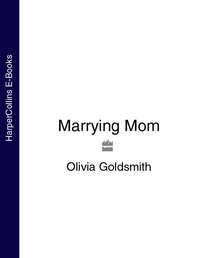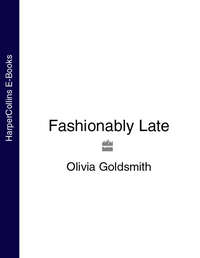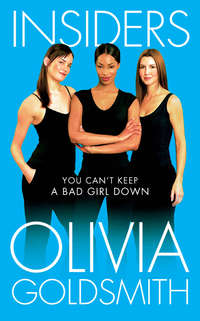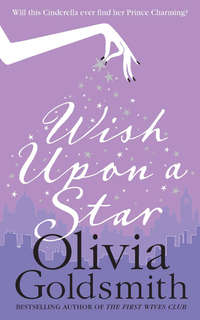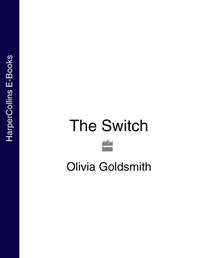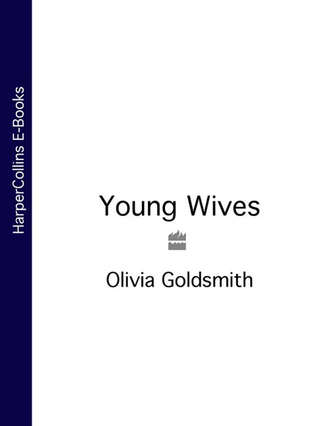
Полная версия
Young Wives
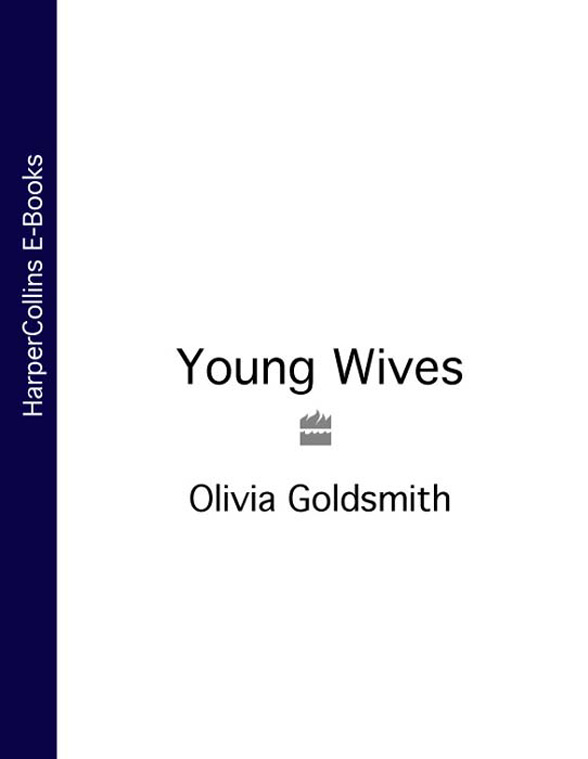

OLIVIA GOLDSMITH
YOUNG WIVES

Copyright
This novel is entirely a work of fiction.
The names, characters and incidents portrayed in it are the work of the author’s imagination. Any resemblance to actual persons, living or dead, events or localities is entirely coincidental.
HarperCollinsPublishers 1 London Bridge Street London SE1 9GF
www.harpercollins.co.uk
This edition 2000
First published in Great Britain by
HarperCollinsPublishers 2000
First published in the USA by HarperCollinsPublishers 2000
Copyright © Olivia Goldsmith 2000
Olivia Goldsmith asserts the moral right to be identified as the author of this work
All rights reserved under International and Pan-American Copyright Conventions. By payment of the required fees, you have been granted the nonexclusive, nontransferable right to access and read the text of this e-book on-screen. No part of this text may be reproduced, transmitted, downloaded, decompiled, reverse engineered, or stored in or introduced into any information storage and retrieval system, in any form or by any means, whether electronic or mechanical, now known or hereinafter invented, without the express written permission of HarperCollins e-books.
HarperCollinsPublishers has made every reasonable effort to ensure that any picture content and written content in this ebook has been included or removed in accordance with the contractual and technological constraints in operation at the time of publication.
Source ISBN: 9780006510536
Ebook Edition © MAY 2015 ISBN: 9780007482030 Version: 2015-05-19
Dedication
In memory of the late Jane O’Connell, a dedicated reader
Contents
Cover
Title Page
Copyright
Dedication
Ring One
1
2
3
4
5
6
7
8
9
10
11
12
13
14
15
16
17
18
19
20
21
22
23
24
25
26
27
28
29
30
31
32
33
34
35
Ring Two
36
37
38
39
40
41
Ring Three
42
43
44
45
46
47
48
49
50
51
52
53
54
55
56
57
58
59
60
61
62
63
64
65
66
67
Keep Reading
Acknowledgments
About the Author
Praise
Also by the Author
About the Publisher
RING ONE
For a woman, marriage is like a circus. There are three rings: the engagement ring, the wedding ring, and the suffering.
Nan Delano
1
In which we meet the improbably named Angela Rachel Goldfarb-Romazzano Wakefield, on the occasion of her paper anniversary, and the strange outcome of that celebration
Angela Wakefield had arrived early, partly because she was a compulsively prompt person—law school had taught her the wisdom of that—but equally because she wanted to savor these moments before their little party began. So she sat, her legs neatly crossed at the ankle, her purse on the third chair, and stared out the window at the water. Marblehead, Massachusetts, was so beautiful that it was not a place she’d ever imagined making her home—her, a dago Jew mongrel from Queens, New York. Even now, though it was well into autumn, sailboats were tacking their way across the harbor, fishing boats were pulling into dock as the sunset turned to twilight. Distant lights had begun to twinkle in homes along the water.
Reid had picked the restaurant and, just like Reid, the club was perfectly groomed. The white cloths on the table glowed in the waning light; the glass and silverware gleamed. The starched napkins had been folded into complicated shapes, kind of like the newspaper soldier hats she used to make to play army, though these napkins were much prettier.
Angie looked around self-consciously. She was never so neat, so well-pressed as the napkins. Her hair was wild, black and curly, long and not really styled; her clothes were always wrinkled or losing a button. She was told often by Reid that it was part of her charm. Why else would Reid have married her?
Angie looked around the club dining room. She knew not to expect much from the food in places like this: go to a Brookline deli or Boston’s North End for good food. Here the martinis would be dry, the service impeccable. Angie never felt very comfortable alone in the club. She shifted in her chair. In just a little while—since he was usually late—Reid Wakefield III, her husband of one year today, would be sitting opposite her. Reid was comfortable anywhere. He belonged not only to this club but the birthright club welcomed by all.
When the waiter approached Angela inwardly groaned. He asked for her drink order, but she didn’t want to start without Reid, so she apologized and said she’d wait, if it was okay. “He should be here any minute,” she added, checking her watch. Reid was already twenty minutes late, but he was chronic that way, always overscheduling, always so involved with whatever he was doing that he forgot about whatever he was committed to do next. Well, not forget about, exactly. He just juggled a little and—because of his charm—everyone forgave him.
Angie used the time now to pull out her makeup kit and surreptitiously check her face. It was a pretty face—roundish, with round dark eyes, and a generous mouth. Okay, let’s face it—a big mouth in both senses of the word. Now her mouth needed more lipstick—why did it wear off her lips but not off her teeth? She ought to comb her hair, though she knew she shouldn’t do that at the table.
Angie sighed. She was what she was, and Reid had picked her, not one of these real blond, anemic poster girls for Miss Porter’s School. They all had names like Elizabeth and Emily and Sloane, but they—in their understated, unwrinkled clothes and untreated hair—hadn’t attracted the prince that she had. Take that, you Waspettes!
Reid represented sunshine, vitality, and the kind of life that did not have to acknowledge defeat. Cushioned by money and contacts, his family boated and played tennis and celebrated birthdays and weddings and even funerals in a dignified way that boasted of order and control.
Not that Angela was proud of her heritage. Anyway, all of them were new immigrants compared to Reid’s family. The Wakefields had come over after the Mayflower, but only just. Reid’s mother, on the other hand, was a Daughter of the American Revolution—and looked it. She didn’t color her hair or worry about fashion. She was a Barbara Bush type, but prouder. She’d never said that she was disappointed in Reid’s mate, but when Angie thought about it, she didn’t know what they had to be so proud of—they’d stolen their land from the Native Americans. Angela figured they got some credit for stealing it early. And they still owned plenty of it in and around Marblehead.
Angie put her lipstick away and pulled out the wrapped gift she had for her husband. It was their paper anniversary and she had racked her brain to come up with the right present. Here it was: an autographed first edition of Clarence Darrow’s autobiography. Reid—a newly minted lawyer working for Andover Putnam, the most old-line of Boston’s old-line law firms—worshipped Darrow. He’d plotz. Angie patted the package and grinned.
She didn’t allow herself to get too excited by the prospect of his gift to her, though. Men weren’t that good with gifts or romance. Especially WASP men from old money. She’d learned that already: for their first married Christmas, Reid had given her a pair of ski gloves—even though she didn’t ski. When she’d suggested they spend their first romantic weekend away, he’d opted for Springfield, to visit the Basketball Hall of Fame. As if. Worst, for her birthday he’d given her a coffee grinder. She shook her head now, remembering the scene when she’d opened the elaborately wrapped box. “But don’t you like fresh ground?” Reid had asked, shocked when in answer she’d thrown the thing at him. They’d had a huge fight. Later she’d called her mother. “A coffee grinder?” she’d asked. “Is it a Braun? Hey, he’s trainable. Your father once gave me an ironing board.”
Angela had neglected to point out to her mother that she and Angela’s father had divorced, and that she didn’t want that to happen to her and Reid. Instead, “What did you do,” Angie had wept, “when you got the ironing board?”
“I made him swallow it,” her mom admitted. Angie had begun laughing. “Look. Mixed marriages never work,” Natalie Goldfarb-Romazzano said in a comforting voice.
“Don’t tell me that now, after I married a Protestant,” Angela had replied.
“I don’t mean mixed religions. I mean mixed genders. Men and women. Mars and Venus. We’re not from other planets. We’re from other solar systems.”
Now Angie shook her head again at the memory. Her mother was, as her father put it, a real piece of work.
“What’s that about?” a voice asked. “We allow no ‘nos’ here. ‘Yeses’ exclusively. This is a very exclusive club.”
Angie looked up at Reid—her tall golden boy, a water skier, a rock climber, a Princeton grad. In the last reflected light of the sunset, she could swear he glowed. Reid, who had already taken his seat across from her, got up, came over to her chair and bent down and kissed her—a long, lingering one. A public display of affection! She could hardly believe it. And at the club, where no one ever had any feelings, much less showed them! His lips pressed hers. God! He’d been so sweet lately. Angie found his tongue with her own. She felt herself blushing. He took her breath away. Big deal about the coffee grinder. She was so lucky!
Eventually Reid moved back to his chair, untousled, unflushed. The waiter stood behind him. “So, what will you have, Angie?” Reid asked. Then he hesitated, moved her purse, and took the chair beside her. “Too far away from my girl,” he explained, his voice low. Then unexpectedly he put his right hand—the one closest to her under the tablecloth—high on the inside of her thigh. A wave of longing washed over her, so intense that she had to look away, out at the lapping tide. “I want you,” Reid whispered. Then he raised his voice to give their drink order to the hovering waiter. But that interruption didn’t stop him from stroking her thigh. She blushed again while the waiter nodded and left to fetch for the scion of the Wakefield family. Angie always apologized to “the help,” while Reid made them wait, yet they served him better.
“So, what’s this?” Reid asked, placing his other hand on the little package. “Who could it be for?” His voice was full of assurance and teasing.
“Oh, nothing,” Angie said innocently. “For no one. A little anniversary present, maybe, if anyone you know is having an anniversary.”
“Oddly enough, I am. And so is my wife. Could it be for her? Or for me?” He didn’t reach for his gift, though. Instead, to her delight, he pulled a little box from his inside jacket pocket. “Does this look like a Braun?” he asked.
Angela’s heart began to beat even faster. Jewelry? Real jewelry? Aside from her engagement ring and wedding band, he’d never given her jewelry. She tried to be calm as she reached out for the box. It was navy blue leather, unwrapped, and had SHREVE, CRUMP & LOWE stamped in silver letters across the top. Only the best jewelry store in Boston! And the most overpriced, but hey, this was a present. Angela still couldn’t get over the fact that Reid paid retail for things. But on this occasion she was glad. Maybe her mom was right. He was trainable.
Angie stared at the enchanting box and told herself to be calm. It was probably only a sterling key chain or thimble or something, but she’d treasure it forever. “Animal, vegetable, or mineral?” she asked, vamping for time.
“Well, I’m the animal, you’re the vegetable, and the gift is certainly from the mineral world,” he told her.
Yes! She took the little case in her hand. Mineral world. As in gems? Ready to faint, she flipped open the lid; a small but exquisite sapphire surrounded by seed pearls winked at her from the satin interior.
A ring! “Oh, God. It’s beautiful.” She stared at it. “Oh, God,” she repeated.
“It’s a funny thing,” Reid said dryly. “Is this a religious difference? I can’t tell if it’s a Jewish or a Catholic one. But only sex and jewelry get you to mention the Lord’s name.” He squeezed her thigh again and laughed. Angie vowed she’d get to the gym tomorrow after work for sure. She was so grateful to him that she’d keep those thighs thin and toned forever. She reminded herself that her father had started cheating on her mother after her mom had gotten a little—well, zaftig. I’ll eat nothing but fruit salad tomorrow, she thought. The kind packed in water. And I’ll drink four bottles of Evian—the big bottles—even though it means I’ll pee like a horse all day.
“You know what I’d like?” Reid asked her. “I’d like you to promise to do something for me.”
As if she wasn’t already starving and flooding herself for him! As if she wouldn’t give up breathing if he asked her to. “Anything except prostitution or getting my nose fixed,” Angela told him.
He laughed. That was one of the reasons she loved him: he was an easy laugh. Then his face took on a sort of choirboy earnestness that she rarely saw. “Let’s renew our vows,” Reid proposed as he took her hand. “I want to marry you all over again.”
Angela was so touched she felt herself flush. Reid had been unusually romantic lately—flowers, little gifts—but this was so … so very, very sweet. She felt she could either laugh or cry, so she went with the first option. After all, it was a Goldfarb-Romazzano family tradition, especially on her mother’s side. “Might as well laugh,” her mother always advised in crisis. “Then you don’t have to fix your mascara later.”
Angela put her hand out, covering Reid’s beautiful long fingers. “Oh, honey. It’s a wonderful thought. A lovely thought, but …” She paused. He watched her face, as attentive as a puppy, but a lot less mature. She didn’t, now or ever, want to hurt him. So how could she explain? “We only married a year ago, sweetie. It’s … it’s inappropriate to do it again so soon. If you want to say our vows privately I will, tonight or tomorrow or—”
“No!” Reid interrupted. “I want to say them publicly. I mean, with people there. People from work. My family. Yours. You know. A ceremony.”
“A renewal ceremony?” Angela tightened her hand around his. “I just got over the wedding! It took me this long to write and thank your family for all those cheese boards. Anyway, sweetie, people just don’t do it.” His family was usually the one that talked about what was “done.” She thought of the pain she’d caused her mother-in-law already with her social gaffes. They’d nearly fainted when she’d had both a rabbi and a lapsed—and married—former Catholic priest at their ceremony. “It’s … not done,” she repeated. “Not for at least ten years, anyway. Or twenty-five.”
“Why? I love you more now than I did when I married you,” Reid protested. “I want everyone to know that.”
Angie felt tears of total happiness rising. The hell with the mascara. “And I love you more, too,” she agreed. “It’s just that people might think that it’s … well, you know, greedy. Like we expect presents or something.”
“Angie, will you do this for me?” Reid asked earnestly. “Your eyes are so beautiful now, so warm and wet.” He lowered his voice. “I want you this minute. I want to kiss you on your eyelids and make love to you, right here on the floor. But instead, just say yes to the ceremony.”
She couldn’t, not ever, say no to that level of desire in him. She was ready to nod her assent when he continued. “Look. You know my parents didn’t want us to marry. And you didn’t like most of my friends. Plus, let’s face it, they didn’t like you. People said you wouldn’t fit in. Hey, even I had some doubts.”
Angie nodded, still smiling though he’d never mentioned his doubts before and the news surprised her. Of course, she’d had plenty of doubts—about him. His fear of commitment, his family’s coldness, his lack of … well, depth. She’d thought he might back out of the wedding right up until the moment when he turned to the rabbi and said, “I do.”
“Anyway,” Reid continued, “it wasn’t an easy year. I admit we’ve had to take some time to adjust. And then, five months ago, I started this affair. I thought things between you and me weren’t … well, I thought maybe my parents had been right.”
Back up! Angela wasn’t certain she’d heard him. “What! I mean, who …?”
Reid made a gesture with his hand, a sort of flutter that matched the one her heart was making in her chest. “An older woman. From work. But she meant nothing. The affair … I don’t know. It just showed me—after the first gloss of lust wore off—it showed me just how much I really love you.” He leaned forward. The setting sun gleamed behind him. “I want to show that I’d choose you over any woman in the world, Angela. It was a mistake, but my affair taught me something. And I just want to make that knowledge public. I want to—”
His affair? Angela couldn’t really hear anymore. She saw Reid’s lips moving, but she couldn’t hear him. Deafness wasn’t the issue. She was afraid she might die right there at the table. But her pride wouldn’t let her. Her heart was beating so loud that Reid must have heard the noise. She certainly couldn’t hear anything else. She sat, frozen in shock, and watched her husband’s lips move. Lips she’d just kissed. Lips that had lied to her and kissed another woman’s mouth, another woman’s….
“I have to go to the toilet,” Angie said. Then she stood up abruptly and almost ran across the dining room.
2
In which we meet Michelle Russo, Pookie the dog is walked
Michelle got Frankie into bed, which wasn’t easy now that he was six. She shrugged into her jacket and told Jenna she was going out to walk Pookie, their cocker spaniel. In the driveway she looked around guiltily. Frank always yelled at her when he caught her walking the dog. “It’s the kids’ job. You spoil ’em,” he said. It was just that it was easier for Michelle to do it herself than nagging at Jenna. And she could use the air.
As Michelle walked the dog through drifts of leaves she took a moment to look up at the stars. It was chilly and Michelle took her hair out of the scrunchie that bound it up. It fell down below her shoulders in an unmanageable cascade of blond curls that would keep her warm and make Frank hot. She shivered. Elm Street was dark, and despite the cold, this was a time Michelle really enjoyed. It was perhaps the only moment of the day that she spent alone—if you didn’t count Pookie as a companion. The dog pulled on the lead a little bit and Michelle stepped along the sidewalkless curb.
Pookie paused. Uh-oh. Her neighbors, the Shribers and the Joyces, went ballistic if Pookie even lifted a leg anywhere near their property, so she discreetly tried to tug him in the opposite direction. But then she noticed the Joyces’ windows were dark. Maybe they were traveling. Since Mr. Joyce had retired, they had been doing a lot of that. They had lived on this block longer than anybody else. They were pleasant, but never really warm.
Still, Michelle loved them, just the way she loved the entire street and every house on it. This was where she and Frank had chosen to live. The place she had brought both of her children home from the hospital. Frank had taught Jenna to ride without training wheels right here, and one winter afternoon Frankie Junior had gotten his tongue frozen stuck to the lamppost that Pookie was now sniffing. This street was filled with, if not friends exactly, then friendly acquaintances; it was the place they all called home, where their children and their cats and their dogs ran in the grass and fought and played.
Michelle hadn’t had a home growing up. Her mother usually worked as a waitress and came home with some take-out and a six-pack of beer. Her father was always involved in some scheme or other, none of which ever made any money, but did require hours spent in bars.
For a moment Michelle shivered, as if someone had walked on her grave. There was no reason for her to wind up so lucky, unless it was a payback for a really rocky start. Michelle had been born in the Bronx, which was only twenty or thirty miles south of here, but a whole other world. Her mother was Irish, straight from County Cork. Her father was Irish-American, the son of a fireman and a fireman himself—until he reported to work one night so drunk that he walked into a burning building and, feeling invincible, fell six stories when it collapsed.
Michelle hadn’t missed her loud, frightening father. But Michelle was that rare Irish entity, an only child, and she’d been left with her depressed, unreliable mother. And when her mom’s mom got sick “back home,” Sheila returned to Ireland to help. Michelle, only a little older than her own daughter was right now, had waited and waited for her mother’s return. A month seemed a long time to a child; half a year seemed a lifetime. The two years it took before Sheila came back had been enough to do a job on Michelle, dumped as she was with her paternal grandparents, lonely and suspecting that her mother stayed away because she couldn’t face coming back. Michelle had decided then that nothing was as important as loving your husband and your children. She would never be a Sheila.
If Michelle could do it all over again, every bit of her hard, sad early life, she would live through it all as long as she could be assured that she would wind up with Frank Russo, her two kids, and her dog in the safety of this clean suburban harbor in Westchester County; no crime, no grime, no horrors. Healthy food on the table. Clean sheets on the bed. Clothes folded in neat piles in dresser drawers. A yard full of flowers, and two nice cars which never broke down. In the first couple of years of their marriage, Michelle had watched every glass of dago red that her husband drank, expecting him to get drunk and for the picture to fall apart. But he never had. Not once.


